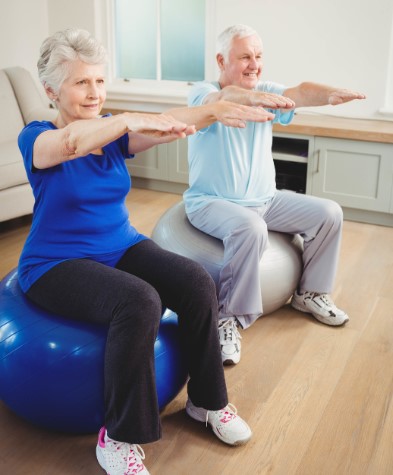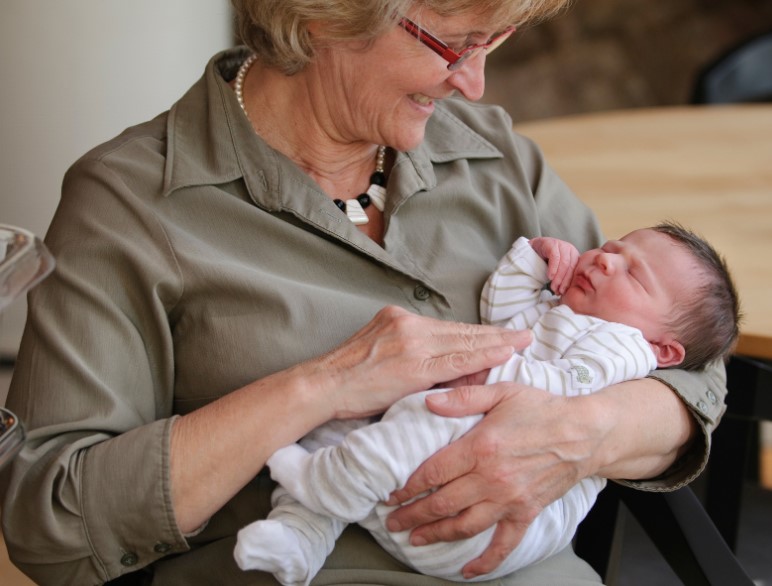Traditionally, I categorize exercise under two primary headings; goal-oriented exercise and daily maintenance.
The distinction between the two is that goal-oriented exercise concentrates on accomplishing progressive benefits, whereas daily maintenance is the practical foundation for sustaining functional movement (to be good at moving – you have to move).
Though goal-oriented exercise can be a bit harder for some people to embrace, ALL adults 55+ should at the least make daily maintenance a part of their lifestyle.
In addition, those participating in and enjoying the benefits of goal-oriented programs will also benefit from these offerings.
So, what is “daily maintenance”? Daily maintenance combines strength conditioning, cardio, and flexibility exercises in a simple-to-follow and sustainable 5-exercise format. The program should take less than an hour to accomplish, is scalable for any conditioning level, and is a fantastic and energizing way to begin the day every day!
#1 Go for a brisk walk! Though casual walking is good, brisk walking improves cardiac health and energy metabolism, develops foot speed/agility, and plays a vital role in significantly reducing fall risk as you age. Also, for this program’s purpose, it doubles as your dynamic warmup. 15-20 minutes is plenty sufficient and can be a good goal if you need to begin more gradually.

(Tip: keep a smooth heel-toe stride, swing your arms, and practice taking deep quality breaths)
#2 Hit those squats or sit-to-stands: Lower body strength is a vital resource that MUST be trained to be retained! Squats are the most efficient and effective means of keeping these muscles sufficiently strong. You should do ONE SET of as many repetitions as possible with good form daily. Please keep track of this number and seek to improve upon it until you reach the number 20.

(Tip: keep your weight on your heels and sit by bending at the hip and then knees)
#3 Big benefit bridges: This simple to-do exercise does so many wonderful things for your body and does not need to be difficult to be effective. With one simple movement, you will stretch over-tight hip-flexor muscles (top of the thighs/groin), activate and condition the glute muscles (vital for hip/knee/lower back health), and build stabilization strength in the vulnerable lower back muscles. You should do ONE SET of raise and hold for as long as you can with good form, ultimately seeking to reach at least a 1-minute.

(Tip: push through the heels, raise the hips as one, squeeze the cheeks, elevate your hips until you feel a gentle stretch in the upper thighs, and hold)
#4 Stretch those hamstrings! Over-tight hamstrings are a common problem for many retired adults and, if left unaddressed, can create significant orthopedic, mobility, postural, and chronic pain issues. The goal is to stretch each side independently for 1 minute (where the pull is tight but not painful), then finish by stretching both sides together for 1 minute.


(Tip: for both versions, keep your knees and back as straight as possible, and reach forward from the hip while keeping your fingers on your shins)
#5 Stretch the chest and shoulder muscles: Because most things happen in front of us, it is common for the muscles on the front side of the body to develop over-tightness. Much like with the hamstrings, if left unaddressed, a series of serious issues can develop, leading to pain and debilitation of the arm. The illustrated version of this stretch below provides a gentle means of stretching these muscles with support and control. The goal is to do ONE SET of this stretch where the muscle tension is tight but not painful for a total duration of 1-minute.

(Tip: keep your head up, have one foot forward one back stance, and lean into the stretch through the chest)
If you are currently not exercising, this program provides an easy-to-follow launch pad to get you started while providing a 100% assurance of benefit!
Once you get a couple of weeks into it, your daily-5 will become the most rewarding habit you will never have to break!
Joe Carson B.S. NASM-CPT/FAS/CN
Master Trainer/Functional Aging Specialist/Certified Nutritionist
Twenty-First Century Aging





